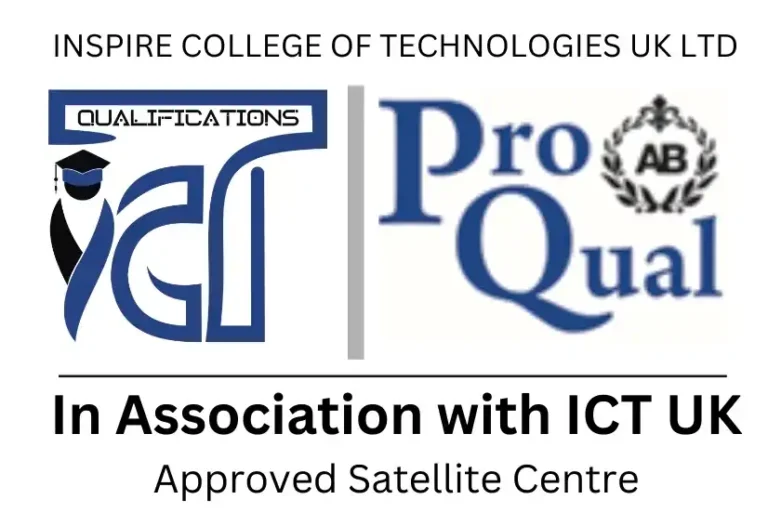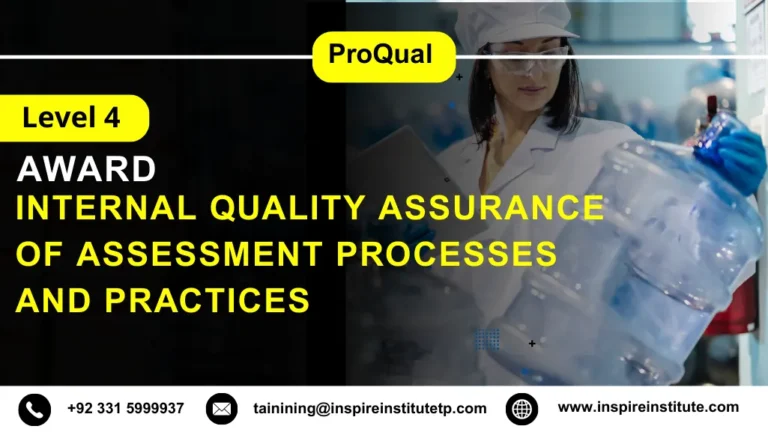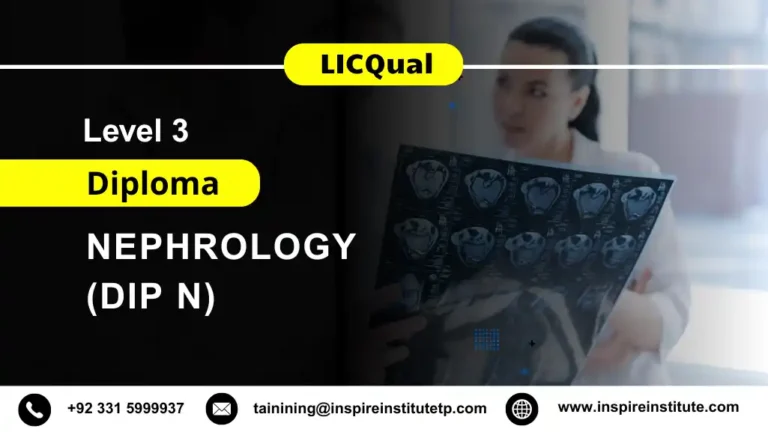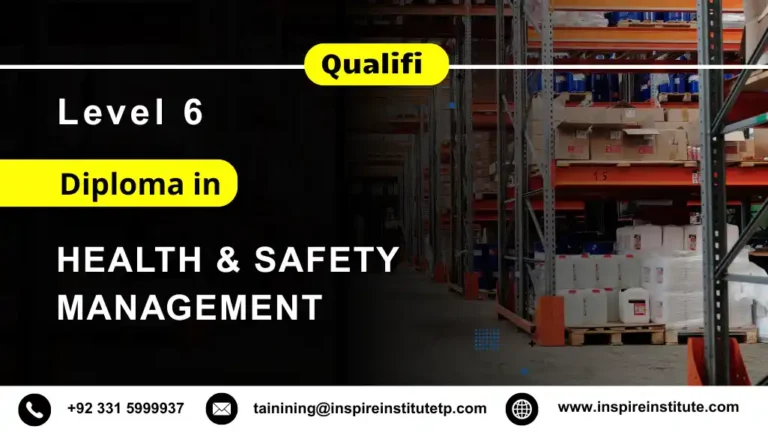ProQual Level 3 Diploma in Management
The ProQual Level 3 Diploma in Management is a nationally recognized, Ofqual‑regulated qualification designed for aspiring managers, team leaders, and professionals seeking to strengthen their leadership and organizational skills. This diploma provides a comprehensive foundation in management principles, equipping learners with the practical knowledge and confidence needed to succeed in supervisory and middle‑management roles.
The course covers essential areas such as communication, team leadership, project management, problem‑solving, and performance monitoring. Learners gain valuable insights into motivating teams, managing resources effectively, and driving organizational success. With a strong emphasis on practical, work‑based learning, the qualification ensures that skills developed can be applied directly to real workplace challenges.
Ideal for individuals new to management or those with some experience looking to formalize their skills, the ProQual Level 3 Diploma in Management enhances career prospects across industries. By completing this program, learners demonstrate their competence in leadership, improve their employability, and lay the groundwork for progression to higher‑level management qualifications.
Whether you are aiming to step into your first leadership role or advance further in your career, this diploma offers a solid pathway to professional growth and long‑term success in management.
Overview
Certifying Body
ProQual
Course Duration
6-12 Months
Evaluation
Assignments Based
Study Units
55-Units
Learning Mood
Online
Qualification Structure
ProQual Level 3 Diploma in Management;
Candidates must achieve 31 Credit from Mandatory units,and remaining From the Optional Units.
Mandatory Unit
- Manage team performance
- Principles of people management
- Principles of business
- Principles of leadership and management
- Manage personal and professional development
Optional Units
- Promote equality, diversity and inclusion in the workplace
- Manage individuals’ performance
- Manage individuals’ development in the workplace
- Chair and lead meetings
- Manage conflict within a team
- Procure products and/or services
- Implement change
- Implement and maintain business continuity plans and
processes - Collaborate with other departments
- Support remote or virtual teams
- Participate in a project
- Develop and maintain professional networks
- Develop and implement an operational plan
- Encourage learning and development
- Discipline and grievance management
- Develop working relationships with stakeholders
- Manage physical resources
- Prepare for and support quality audits
- Conduct quality audits
- Manage a budget
- Manage a project
- Manage business risk
- Manage knowledge in an organisation
- Manage redundancy and redeployment
- Encourage innovation
- Manage the impact of work activities on the environment
- Recruitment, selection and induction practice
- Buddy a colleague to develop their skills
- Contribute to the improvement of business performance
- Negotiate in a business environment
- Develop a presentation
- Deliver a presentation
- Contribute to the development and implementation of an
information system - Resolve customers’ problems
- Resolve customers’ complaints
- Gather, analyse and interpret customer feedback
- Health and Safety Procedures in the Workplace
Manage events - Review the quality of customer service
Upon completing the ProQual Level 3 Diploma in Management in Management, learners will be able to:
Manage team performance
- Understand the management of team performance
- Be able to allocate and assure the quality of work
- Be able to manage communications within a team
Principles of people management
- Understand the principles of workforce management
- Understand equality of opportunity, diversity and inclusion
- Understand team building and dynamics
- Understand performance management
- Understand training and development
- Understand reward and recognition
Principles of business
- Understand business markets
- Understand business innovation and growth
- Understand financial management
- Understand business budgeting
- Understand sales and marketing
Principles of leadership and management
- Understand the principles of effective decision making
- Understand leadership styles and models
- Understand the role, functions and processes of management
- Understand performance measurement
Manage personal and professional development
- Be able to identify personal and professional development requirements
- Be able to fulfil a personal and professional development plan
- Be able to maintain the relevance of a personal and professional development plan
Promote equality, diversity and inclusion in the workplace
- Understand the organisational aspects of equality, diversity and inclusion in the workplace
- Understand the personal aspects of equality, diversity and inclusion in the workplace
- Be able to support equality, diversity and inclusion in the workplace
Manage individuals’ performance
- Understand the management of underperformance in the workplace
- Be able to manage individuals’ performance in the workplace
Manage individuals’ development in the workplace
- Be able to carry out performance appraisals
- Be able to support the learning and development of individual team members
Chair and lead meetings
- Be able to prepare to lead meetings
- Be able to chair and lead meetings
- Be able to deal with post-meeting matters
Manage conflict within a team
- Understand the principles of conflict management
- Be able to reduce the potential for conflict within a team
- Be able to deal with conflict within a team
Procure products and/or services
- Be able to identify procurement requirements
- Be able to select suppliers
- Be able to buy products and/or services
Implement change
- Understand the principles of change management
- Be able to plan the implementation of change
- Be able to manage the implementation of a change plan
- Be able to evaluate the effectiveness of the implementation of change plans
Implement and maintain business continuity plans and processes
- Be able to plan for the implementation of business continuity plans and processes
- Be able to implement business continuity plans and processes
- Be able to maintain the fitness for purpose of on-going business continuity plans and processes
Collaborate with other departments
- Understand how to collaborate with other departments
- Be able to identify opportunities for collaboration with other departments
- Be able to collaborate with other departments
Support remote or virtual teams
- Be able to assess the support needed by remote or virtual teams
- Be able to support remote or virtual teams
Participate in a project
- Understand how to manage a project
- Be able to support the delivery of a project
Develop and maintain professional networks
- Understand the principles of effective networking
- Be able to identify professional networks for development
- Be able to maintain professional networks
Develop and implement an operational plan
- Understand the principles of operational planning
- Be able to develop an operational plan
- Be able to implement an operational plan
- Be able to evaluate the effectiveness of an operational plan
Encourage learning and development
- Understand the principles of learning and development
- Be able to support individuals’ learning and development
- Be able to evaluate individuals’ learning and development
Discipline and grievance management
- Understand the principles supporting the management of discipline and grievance cases
- Be able to manage a disciplinary case
- Be able to manage a grievance
Develop working relationships with stakeholders
- Understand working relationships with stakeholders
- Be able to determine the scope for collaboration with stakeholders
- Be able to develop productive working relationships with stakeholders
- Be able to evaluate relationships with stakeholders
Manage physical resources
- Be able to identify the need for physical resources
- Be able to obtain physical resources
- Be able to manage the use of physical resources
Prepare for and support quality audits
- Understand the principles underpinning the management of quality
- Be able to prepare for quality audits
- Be able to support quality audits
Conduct quality audits
- Understand the principles underpinning the management of quality
- Be able to prepare to carry out quality audits
- Be able to conduct quality audits
Manage a budget
- Understand how to identify financial requirements
- Understand how to set budgets
- Be able to manage a budget
- Be able to evaluate the use of a budget
Manage a project
- Understand the management of a project
- Be able to plan a project
- Be able to manage a project
- Be able to evaluate the effectiveness of a project
Manage business risk
- Understand the management of business risk
- Be able to address business risk
- Be able to mitigate business risk
Manage knowledge in an organization
- Understand the principles of knowledge management
- Be able to identify knowledge to be managed within an organization
- Be able to manage knowledge within an organization
Manage redundancy and redeployment
- Understand the management of redundancy
- Understand the principles of redeployment
- Be able to manage a redundancy
- Be able to manage the redeployment of staff
Encourage innovation
- Be able to identify opportunities for innovation
- Be able to generate and test ideas for innovation and improvement
- Be able to implement innovative ideas and improvements
Manage the impact of work activities on the environment
- Understand how to support environmentally-friendly working practices
- Be able to organise work so as to minimise the impact on the environment
- Be able to manage the environmental impact of the use of resources
Recruitment, selection and induction practice
- Understand the principles and theories underpinning recruitment, selection and induction practice
- Be able to recruit people into an organization
- Be able to select appropriate people for the role
- Be able to induct people into an organization
Buddy a colleague to develop their skills
- Understand how to buddy a colleague
- Be able to plan to buddy a colleague
- Be able to support a buddy colleague carrying out work activities
Contribute to the improvement of business performance
- Understand the principles of resolving business problems
- Understand improvement techniques and processes
- Be able to solve problems in business
- Be able to contribute to the improvement of activities
Negotiate in a business environment
- Understand the principles underpinning negotiation
- Be able to prepare for business negotiations
- Be able to carry out business negotiations
Develop a presentation
- Understand how to develop a presentation
- Be able to develop a presentation
Deliver a presentation
- Understand the principles underpinning the delivery of presentations
- Be able to prepare to deliver a presentation
- Be able to deliver a presentation
Contribute to the development and implementation of an information system
- Understand the design and implementation of an information system
- Be able to contribute to the development of an information system
- Be able to contribute to the implementation of an information system
Resolve customers’ problems
- Understand the monitoring and resolution of customers’ problems
- Be able to deal with customers’ problems
Resolve customers’ complaints
- Understand the monitoring and resolution of customers’ complaints
- Be able to deal with customers’ complaints
Gather, analyse and interpret customer feedback
- Understand how to gather, analyse and interpret customer feedback
- Be able to plan the collection of customer feedback on customer service issues
- Be able to gather customer feedback
- Be able to analyse and interpret customer feedback to recommend improvements
Employee rights and responsibilities
- Understand the role of organisations and industries
- Understand employers’ expectations and employees’ rights and obligations
Health and Safety Procedures in the Workplace
- Know health and safety procedures in the workplace.
- Be able to carry out tasks with regard to health and safety in the workplace.
Manage events
- Understand the management of an event
- Be able to manage the planning of an event
- Be able to manage an event
- Be able to follow up an event
Review the quality of customer service
- Understand how to review the quality of customer service
- Be able to plan the measurement of customer service
- Be able to evaluate the quality of customer service

Inspire Institute of Technologies is Approved Satellite Centre of ProQual

Entry Requirements
- Applicants must be 18 years of age or above at the time of registration.
- A minimum of secondary school education (Grade 10–12 or equivalent) is recommended.
- Are currently working in a supervisory, team leader, or junior management role
- Learners must have sufficient English language proficiency to:
- Understand management concepts and workplace policies
- Participate in discussions and presentations
What You Need to Know
This qualification is designed for aspiring managers, team leaders, and supervisors who want to strengthen their leadership and organizational skills. It is also suitable for professionals with some management experience who wish to formalize their expertise with a recognized qualification.
The ProQual Level 3 Diploma in Management provides a solid foundation in management principles and practices. It equips learners with practical skills in communication, problem‑solving, team leadership, and performance monitoring, helping them succeed in supervisory and middle‑management roles.
- Ofqual‑regulated and nationally recognized certification
- Competency‑based assessment with practical workplace application
- Enhanced career prospects across industries
- Development of leadership, resource management, and organizational skills
- Provides a pathway to higher‑level management qualifications
Graduates can pursue roles such as team leader, supervisor, project coordinator, or junior manager in sectors including business, retail, hospitality, and public services.
Learners can progress to advanced qualifications such as the ProQual Level 4 Certificate or Level 5 Diploma in Management, or continue toward specialized leadership and business management programs.
Yes. While UK‑based, the ProQual Level 3 Diploma in Management is respected globally due to its competency‑based structure and alignment with international management standards. Employers worldwide value this qualification when recruiting skilled managers.





